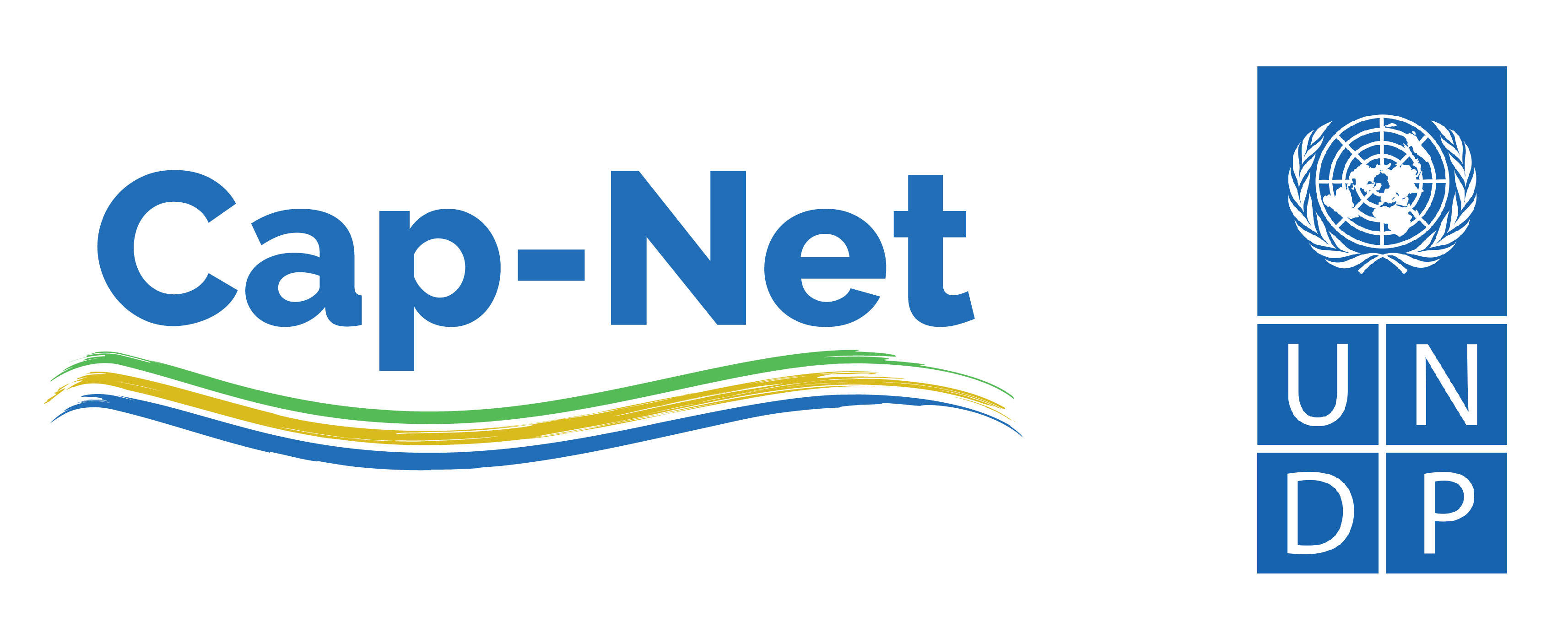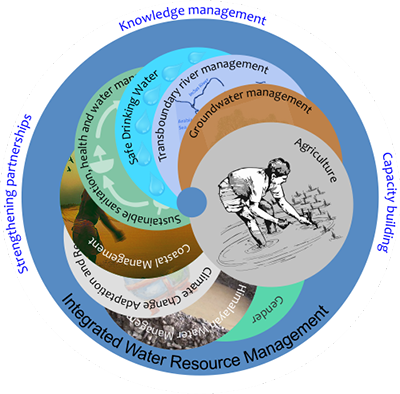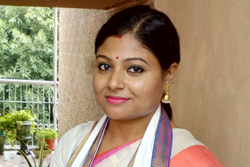SCaN has involved through:
- Capacity building of professionals, community members, government officials, representatives of decentralized institutions on issues of gender, governance, sustainable water resource management, and climate change in the framework of IWRM,
- Development of training modules/manuals for education and capacity building on IWRM,
- Support educational training programs and fellowships for young professionals to promote interdisciplinary approach of water discourses,
- Promotion of networks and institutional strengthening through engagement of private and public sectors in South Asia.
-
Stakeholders Capacity Development on Sanitation and Water for All towards Mutual Accountability [15th November, 2020]
The Sustainable Development Goals (SDGs) require that governments engage with all actors through participatory multi-stakeholder processes in ensuring universal access to water and sanitation services for all, leaving no-one behind. Achieving sanitation, hygiene and water for all, always and everywhere, requires coordinated collaborative action at global, national and sub-national levels. Accountability is central to ensuring sanitation and Water for All. SWA secretariat has initiated a study in six countries through IRC on mutual accountability mechanism.
Bangladesh Centre for advanced studies (BCAS), South Asia consortium for interdisciplinary water resource studies (SaciWATERs) and Cap-Net jointly organized anonline capacity development program on fostering “Stakeholders capacity development on sanitation and water for all towards Mutual accountability” through Improved awareness and understanding among the stakeholders in the WASH sector especially in emergency situations such as Covid-19 and focused on Improved collaboration behaviours among the stakeholders towards mutual accountability, for promoting and ensuring sustainable WASH services.
37 participants have joined webinar. During the webinar matters related to existing practices, challenges, and opportunities for mutual accountability mechanismswithin a multi-stakeholder partnership were discussed. Speakers delved into the MAM framework.
Webinar has been instrumental in promoting the knowledge about mutual accountability mechanisms. During the evaluation, 90% participants have said webinar has relevant over75% of participants have rated the webinar as highly relevant and useful. As the webinar served as an instrument and knowledge sharing platform about mutual accountability mechanism. 67% of participants said presentations and methods were very helpful in learning while all the participants100% have expressed the webinar is in the range of somewhat (53%) relevant to highly (47%) interactive. Participants have expressed that such learning sessions needs to be organized periodically to promote mutual accountability mechanism.
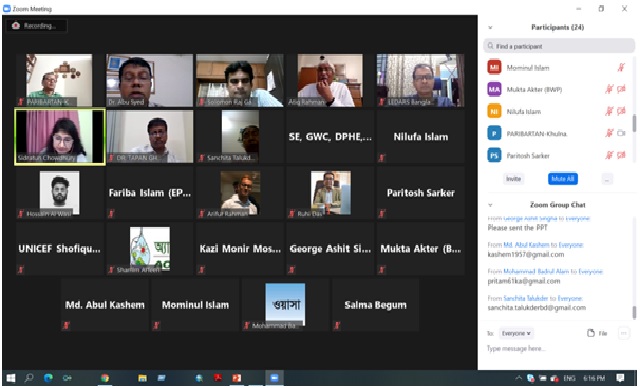
-
Capacity Building Program on Bridging the Gaps among Technological Innovations, Policy Interventions and Ground Realities for the Stakeholders [12-16 October 2020]
In India,around 1 million people are at risk for arsenic contaminated drinking water. Concentration of Arsenic is higher in flood plains of Ganga and Brahmaputra rivers. The spread of arsenic contaminated ground water is mainly in the states of West Bengal, Jharkhand, Bihar, Uttar Pradesh, Assam, Manipur and Chhattisgarh.Dealing with arsenic mitigation is much more challenging in comparison to other water quality elements because it iscolourless, odourless and tasteless. To know the level of arsenic contamination in water, appropriate testing of water is required using laboratory or mobile testing methods. Similarly, its impacts on human health are also not visible immediately. Understanding all these challenges, including awareness which is theprevalentamong all, there is a pressing need of capacity building programs especially for frontline workers.
The Capacity Building Programme towards Mitigation of Arsenic in Drinking Water in Assam & Bihar under Project Civil Society Voices, Vulnerable Communities and Localised Platform for addressing Water Quality Challenges were coordinated and organized by the Arsenic Knowledge and Action Network of SaciWATERs with financial support from European Union and Cap-Netusing an online platform.It was a three part series, from 12-16October 2020.
The first session aimed at disseminating potential technologies to mitigate Arsenic and to create awareness of the supporting schemes that exist. The aim of the training was to build the capacity of Executive Engineers, Assistant Engineers, and Junior engineers or officials of similar rank from the various departments, CSO representatives etc.The state-specific sessions for Bihar and Assam were platforms where the expert speakers on the panel were government officials and CSO representatives. The workshop sessions 2 and 3 provided the insights from officials from water, health, nutrition and other relevant departments on state-specific water quality policies. Officials from CSO and NGO representatives shared their treasure of knowledge from the ground realities, the opportunities, gaps and challenges they face as they work at the ground level. Executive engineers, local CSOs/NGOs people, ASHA and Anganwadi workers, ANMs, Rural Water user association and other stakeholders from the state were invited to benefit as participants in this workshop.
The training program mode was online and it was successful in bringing several stakeholders to a common platform with a common goal of mitigating arsenic problems in drinking water and public health. Knowledge sharing of potential technologies by experts among various stakeholders. The issues brought out by the experts can be incorporated while designing the policies to mitigate water quality issues and the importance of community engagement in mitigating arsenic problems in the affected areas. The SaciWATERs Arsenic Knowledge and Action Network along with Cap-Net network will continue its initiative to bring diverse stakeholders together; for the common goal of solving water quality issues related to arsenic contamination.
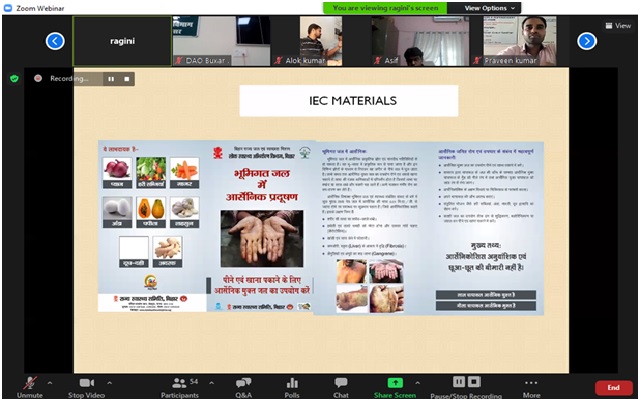
-
Training of Trainers (ToT) in Interdisciplinary Field Research Methodology (IFRM) and Gender and Water – Lecture series [29-sep-20 to 29-Oct-20]
SaciWATERs, the South Asia Consortium for Interdisciplinary Water Resources Studies, is a policy research institute based in Hyderabad, India. From its inception in 2001, it has focused on critical issues related to water resources management in South Asia. SaciWATERs coordinates the SAWA (South Asia Water) Leadership Programme of Climate Change in partnership with four Universities from across South Asia - Bangladesh University of Engineering and Technology (Dhaka), Anna University (Chennai), Nepal Engineering College, and University of Peradeniya (Kandy). As a part of this project SaciWATERs organised a training lecture series, with co-funding from CapNET, on two crucial themes of interdisciplinary climate and water research –
1. Interdisciplinary Field Research Methods
2. Gender and Water
The virtual lecture series was designed for students and professors of Integrated Water Resources Management with the aim to provide multidisciplinary insights to the engineering faculty and post- graduate students (SAWA Fellows) from the four universities to ensure a greater degree of interdisciplinary element in the IWRM research. The lectures on Interdisciplinary Field Research Methods covered modules on approaches and frameworks for interdisciplinary lenses, paradigms in social science research, varied qualitative research methods, collection and analysis of data, and means of community engagement. The lectures on the theme of Gender and Water included concepts, rationales, and frameworks of gendering water research and methods of incorporating gender lens to research.
The training was highly effective due to the interactive nature of the engagement between trainers and students, and the delivery of the content in a simple and accessible manner including language, relatable illustrations for complex social theories, and ample background preparation material for students including exercises and readings outside the classroom. Building water and climate leadership is a core objective of this project, and an interdisciplinary lenses that include social inclusiveness alongside the physical understanding of water resources and climate change is crucial to building this socially sensitive voice of the youth.
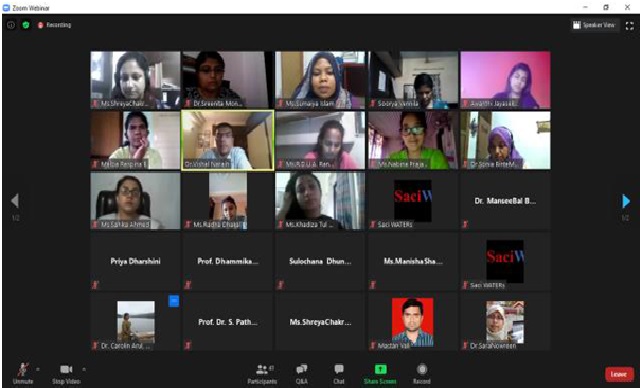
-
District platform for arsenic mitigation: Training and capacity building for stakeholders
On 13-28 September, a series of two-day capacity-building workshops for stakeholders were conducted in four Indian districts – Buxar, Bhagalpur (Bihar) Nalbari, and Jorhat (Assam). – with the support of Cap-Net and the European Union.
SaciWATERs has been working with these four district administrations and relevant stakeholders in the past to establish a district-level, people-centric platform for addressing arsenic challenges. The workshops provided capacity building on these issues and the platform.
The capacity-building workshop had three key goals: (a) Understanding arsenic as a pollutant of water and its effect on human health, (b) Learning about individual and community level arsenic mitigation measures as well as understanding the various local level alternative water sources and (c) Understanding the roles and responsibilities of different stakeholders and institutions for the sustainable mitigation of arsenic.
The training program included classroom session, open discussions and field visit. In the classroom sessions, the participants were introduced to the concept of arsenic and its impact on human health, the role of nutrition for the prevention of arsenicosis, alternative safe water sources (rainwater harvesting, pond rejuvenation etc.) and arsenic removal technologies. A total of 248 people were trained across the 4 districts and among them 30% were female. During the workshops, two technologies were piloted. One was “Arsiron Nilogan” developed by Tezpur University, Assam and the other was “Bio sand filter” developed by Sehgal Foundation, Delhi. Their installation, costs and operational procedures and maintenance (O&M) were discussed. Besides, a separate session was conducted for the plant operators of the water supply schemes, engineers, PRI members and representatives of water users committee regarding the operation & maintenance and community role for sustaining Public Water Supply Schemes (PWSS). This was followed by a field visit.
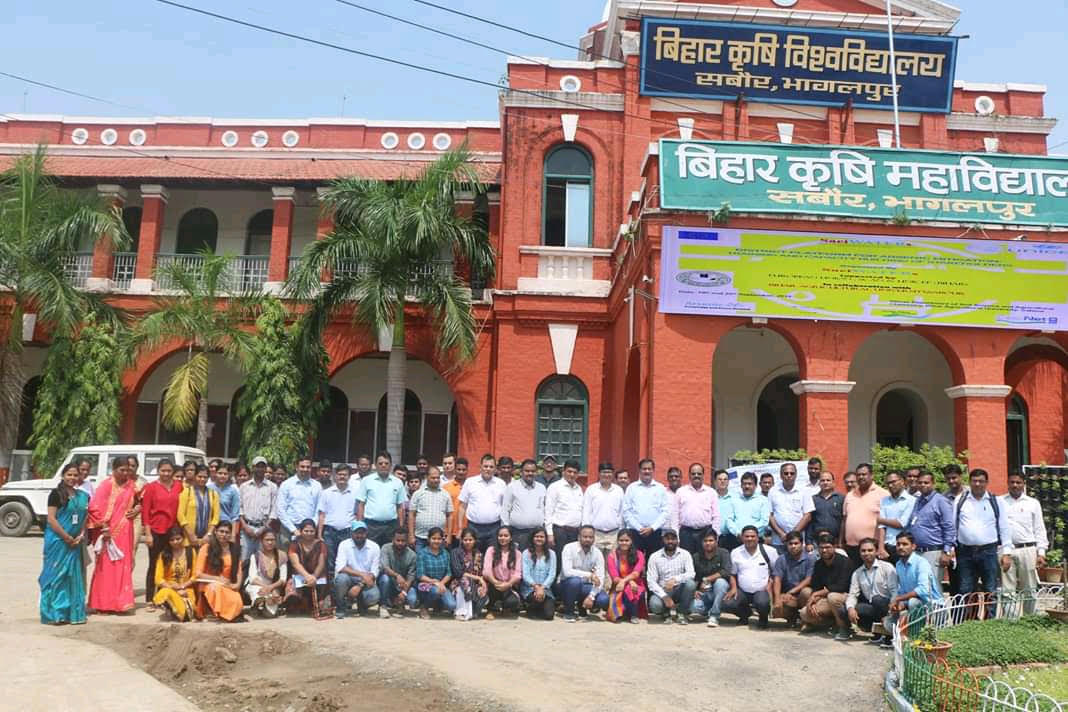
-
Regional Training Workshop on ‘Leadership and research methods for interdisciplinary water research’ brings together women Water Engineers from 4 South Asian countries- 2019
SaciWATERs, the South Asia Consortium for Interdisciplinary Water Resources Studies, a policy research institute based in Hyderabad, India has been coordinating a fellowship program on South Asian Water (SAWA) Leadership Program on Climate Change funded by IDRC, Canada under the climate change program. As part of this project, a regional training workshop on ‘Leadership and research methods for interdisciplinary water research’ was organized by SaciWATERs and Anna University with funding from IDRC, Canada and UNDP cap-net (SCaN) in Chennai, India from August 26th to September 7th 2019. The aim of the workshop was to build the capacities of the SAWA fellows in understanding climate change and water insecurity through the application of interdisciplinary research methods that include gender and social approaches and to develop leadership skills through activities such as team-building sessions, communication skills, application of negotiations and conflict resolution in the field. The workshop brought together 13 SAWA fellows (women engineers) who are pursuing Masters in Integrated Water Resources Management (IWRM) along with 4 professors from four institutions in Bangladesh, India, Nepal and Sri Lanka. Apart from that it also trained 19 post-graduate students (both men and women) from the IWRM stream of Centre for Water Resources, Anna University, Chennai. The 13 days training program was designed in such a manner that students can have a hold of research methods and theoretical frameworks for interdisciplinary water research, including paradigms in interdisciplinary research, interdisciplinary framework and theories in water research, research tools and techniques for urban water research, Climate change: Science and society; Methods of analysis and interpretation. It also included a strong component of conceptualization and application of gender. In addition to classroom teaching, the training had a strong fieldwork component to ensure that the fellows could apply what they have learnt; both in terms of research methods and leadership.
-
Workshop on ‘Leadership and research methods for interdisciplinary water research’ 2018
A Regional workshop on ‘Leadership and research methods for interdisciplinary water research’ was organised in Kathmandu, Nepal from August 23rd to September 5th 2018. The workshop was a part of the South Asian Water (SAWA) Leadership Programme on Climate Change, a fellowship project funded by IDRC and coordinated by SaciWATERs. The aim of the workshop was to train the SAWA fellows in the application of research methods that include gender and social approaches, in leadership skills development through activities such as team-building sessions, communication skills, application of negotiations and conflict resolution in the field. The participants of the workshop were the awardees of the SAWA Fellowship who are pursuing Masters in Integrated Water Resources Management (IWRM) in four institutions in Bangladesh, India, Nepal and Sri Lanka. In addition to classroom teaching, the training had a strong fieldwork component to ensure that the fellows would apply what they have learnt; both in terms of research methods and leadership. The fieldwork was carried out in Shankarapur Municipality, Nepal for four days. The fieldwork was followed by a two-day write-shop wherein the students will be asked to write the methods that they have employed in answering the question, and elaborating on the findings and the best possible solutions.
-
Training Program on capacity building of local body members (selected) on water and sanitation in Kendrapara district of Odisha 2018
A Regional training program on ‘capacity building on water and sanitation’ was organized in Kendrapara district, Odisha from September 3rd to September 29th 2018. This training program on water and sanitation was designed as a programme of initiative and training workshop addressing various aspects of water and sanitation in the rural areas with special emphasis on the Swacha Bharat Mission or the Clean India Campaign of the Government of India addressing sanitation the SBA and Total Sanitation Campaign (TSC) to make India Open Defecation Free by 2022. It was organized by the Institute for Rural Development and Planning (IRDP) with the financial support from UNDP Cap-Net, SaciWATERs. The aim of the training was to increase the capacity of the local body leaders as the local bodies are the implementing agencies of the programmes and schemes of the government and this kind of capacity building will bring good governance and overall development to the rural areas. This capacity-building programme has trained 210 ward councillors from 9 CD blocks of Kendrapara district of Odisha.
-
Brahmaputra River Symposium -2017
Brahmaputra Symposium is the outcome of a four years dialogue initiated in 2013, titled “Transnational Policy Dialogue for Improved Water Governance of the Brahmaputra River”. Started as a bilateral dialogue initiative between India and Bangladesh, it eventually in 2014 evolved into a multilateral and multi-stakeholder dialogue with the involvement of China and Bhutan. The dialogue initiative aims to create a platform for the discussion of the issues, challenges, and opportunities towards improved co-management of the river basin. On 25th and 26th September 2017, as an outcome of this dialogue initiative, “Brahmaputra River Symposium: Knowledge Beyond Boundaries” was jointly organised by the dialogue partners - SaciWATERs, UNDP Cap-Net, IIT-Guwahati and TERI - at New Delhi, by bringing together nearly 150 delegates from South Asia and beyond, from diverse disciplines and background. The Brahmaputra Symposium, a first of its kind, served as a platform for various stakeholders, such as river basin managers, policy-makers, scientists, academics, CSOs and community organizations from all the four basin countries, for the first time to share information, knowledge and experience about managing a transboundary river basin like Brahmaputra.
-
Capacity Building Training on Water rights, equity, and gender issues for working water professionals in South Asia and promotion of education curriculum
Training in 2016 will be a continuum to the dialogue process and lesson sharing from 2015 Cap-Net supported Capacity Building Training amongst the stakeholders at field and policy level to assist the development of education and extension curriculum in agriculture and water sector. The Phase II of the Gender Capacity Building Training will promote the education curriculum and make suggestions from practitioners involved in water, agriculture and environment sector for wider circulation through universities (North Bengal University and Bangladesh Agriculture University). This will help promote new gender knowledge applicable for development practice and build capacities of relevant stakeholders and actors. The activity proposed will be implemented in December 2016.
-
Sustainable Management of Groundwater Resources in South Asia: Technology, Economics, Institutions and Policy
The capacity building training aims to refresh theoretical understanding of the factors affecting groundwater availability, and demand, and an empirical knowledge of groundwater balance scenario in different South Asia regions and acquaint participants with the management alternative for ensuring water for basic survival needs, livelihoods and to facilitate exchange of views on various tools and techniques for implementing management alternatives in their field level implementation in different context. The proposed training will be implemented by Madras Institute of Development Studies (MIDS), and Institute for Resource Analysis and Policy (IRAP) in the month of March 2016.
-
Training on Research Methodologies for South Asian Water (SAWA) Fellows
SaciWATERs in collaboration with its four South Asian partner institutions will address these water issues by striking at the root of the problem —university learning —through an integrated and interdisciplinary water resources management program in Bangladesh, India, Nepal and Sri Lanka. It plugs two key gaps by generating water problem-solving research, while creating a generation of interdisciplinary water professionals, trained to tackle water issues using multi-disciplinary approaches sensitive to women, the poor, the environment and sustainability. The training is proposed to generate interdisciplinary water professionals’ trained in integrated water resource management, gender and social inclusion issues to deal with concerns of food insecurity, adaptability to climate change and resilience. The proposed training will be conducted in December 2016.
-
Training and Module Development on Arsenicosis for Medical Practitioners and Preventive Measures to Check its Spread and Severity
The incidence of arsenic contamination and the number of afflicted regions in South Asia (particularly in India, Bangladesh and Nepal) is growing, with the possibility of arsenic contamination of previously safe aquifers becoming a reality. The proposed training will bridge the knowledge gaps through the development of localised training modules and gauge the response and effectiveness of the module, build capacities of the participants around Arsenicosis prevention, its prevalence, sources, challenges and solutions of water contaminations and provide low cost sustainable technology to address the arsenic contamination in water through pilot installations. The proposed training will be conducted in Nepal, India and Bangladesh from June to October 2016.
-
Sustainable Transboundary management of the Brahmaputra River System in a changing climate for water security and disaster resilience in South Asia
The proposed training aims to develop comprehensive training module and archives on scientific literature, and sensitize a group of water professionals from four different countries on equitable water distribution based on the principles of IWRM through the impacts of climate change across the Brahmaputra river basin. To learn about the relationship of the river and the communities living on its banks with exploration of adaptation, resilience, social and cultural dimensions of the synergy between the river and its people through intensive field training. The participants in the training program includes decision/policy makers, water managers, media persons engaged in Government sectors, non-Government organisations, donor agencies, research institutions from India, Bhutan, Bangladesh and China. The proposed training will be conducted in March - April 2016, India.
-
Capacity Building of SACOSAN Members to promote integrated WASH services through the application of SSWM Toolbox
In South Asia an estimated 26 per cent of the population practice open defecation, the proportion of the population using shared or unimproved facilities has declined to 18 per cent but open defecation remains the highest of any region (39 per cent). The South Asian governments have carried out several efforts to improve sanitation coverage but often their achievements have varied due to systemic challenges and cultural differences. There are no inter-linkages between water and sanitation issues with other development sector and there are no regional specific targets in South Asia. The training on Sustainable Sanitation and Water Management (SSWM) toolbox will support South Asian Government Officials to draw the inter-linkages with water, sanitation and beyond (with other development sectors such as agriculture, social development, health and economic development). The training will help relook into the regional specific sanitation targets that are currently committed by the member states to the SDGs. The proposed training will be implemented in June 2016, India.
-
Capacity Building on Climate Change and Water Resource Management for Forest Professionals in South Asia
Despite the large degree of uncertainty surrounding the potential impacts of climate change upon forests and water, an apparently endless stream of information, methods, approaches, and frameworks have been developed to account for these changes in forest management planning. The proposed training will develop capacities on assessment methodologies of environmental impact, risk, vulnerability and resiliency assessments and develop inter-linkages between ecosystem services through an IWRM framework. The participants will be familiar to decision-making tools on regional climate scenario, simplified tree species distribution model and hydrological stream temperature model. The training will be implemented in partnership with New Brunswick Climate Change Research Collaborative (NBCCRC); Association of Registered Professional Foresters (ARPFNB); University of Toronto Scarborough Campus, Department of Physical and Environmental Science; Université du Québec à Montréal and SaciWATERs in the month of May 2016.
-
Rural peri-urban water conflicts: Challenges for governance & water Justice in South Asia
This workshop aims at developing a perspective for development practitioners, researchers and scholars investigating issues of water justice and governance in the context of peri-urban South Asia. These two larger perspectives are looked from the concept of water rights, legal pluralism, & equity, but specifically framed using the lenses of economics, law, and anthropology. It also aims to encourage the participants to practically apply the concepts in their project/ programme settings in the future. The proposed capacity building training will be implemented by SaciWATERs, International WaTERs Network – British Colombia University, and SOPPECOM in the month of April/May 2016.
-
Workshop on Module development on rural urban linkages and peri-urban water governance
The module will sensitize participants to the peri-urban dimensions and rural-urban linkages in water governance. The focus will be on how urbanization processes engender rural-urban transformations and create new intermediary spaces between the village and the city and how this influences water resources governance as well as the flows of water between rural and urban areas. Participants are then exposed to different theoretical frameworks for studying these processes, their equity and justice dimensions and important governance and public policy issues in addressing the challenges posed by them. The proposed training will work with the group of academicians, practitioners, and government officials to include the useful aspects of water governance relating to rural and peri-urban linkages. This consultation work will bring detailed linkage between science and policy to support decision-making for the growing water insecurity in the peri-urban areas. The proposed workshop will be conducted in partnership with SaciWATERs; International WaTERs Network – British Colombia University, and SOPPECOM.
-
Capacity Building of Famers on Equitable Groundwater Management in Karnool District, Andhra Pradesh
Andhra Pradesh experiences of droughts and farmer’s suicide cases are the negative impacts of droughts that have threatened agriculture production and livelihoods of rural communities in the State. The erratic rainfall caused by climate variability has led to increasing demand for groundwater resources. Excessive extraction for irrigation with minimal recharge system has not only salinization the groundwater resources, but also increased chemical contamination such as Arsenic and Fluoride. The proposed training will enhance knowledge on Groundwater Management, climate change adaptation and capacitate resilience strategies through promotion of climate smart agriculture and water management techniques. The proposed training will be implemented by BIRDS, Andhra Pradesh.
-
Cap Tec Meeting Materials
SCaN Coordinator attended the UNDP – Cap-Tec Stakeholder’s Meeting at UNESCO – IHE, Delft on March 26th -27th 2015. The purpose was to develop a partnership in capacity development on the use of new technologies for improved water productivity and management. The meeting gathered the supply and demand sides of new technologies; water professionals and managers, development practitioners, policy makers, farmer representatives and industrialists, researchers, and capacity development specialists.
Detail report -
Capacity Building Training on Water rights, equity, and gender issues for working water professionals in South Asia
The training program aims to create and refresh participants' awareness on water rights, equity, and gender issues. It encourages participants to practically apply the concepts in their project/ programme settings. Participants in the capacity building training will be exposed to different concepts of water rights from economics, law, and anthropology. The legal plural perspectives on water rights familiarize participants with the existence of different normative repertoires that provide the basis for a claim to water. For example, the co-existence of state laws and farmers’ methods of water sharing could create both conflict and cooperation. Collaborators for organizing the training programs are South Asia Consortium for Interdisciplinary Water Resources Studies (SaciWATERs); North Bengal University (NBU, India), International Water Resource Management (IWMI, Nepal), Interdisciplinary Center for Food (ICF) at Bangladesh Agriculture University (BAU, Bangladesh), Nepal Madesh Foundation (NEMAF, Nepal) and Water Resource Management Group at Wageningen University (WU, The Netherlands).
-
Negotiated Approach workshop at South Asia Level on Integrated Ground Water Management
The workshop intends to increase stakeholder’s (local communities as well as local government) knowledge on needs and perception assessment with regard to groundwater resource management and to build capacities on Rights to information and Rights to water and sanitation. Two ‘one-day’ workshops will be organized in Khulna (Bangladesh) and Kolkata (India) in regional language (Bangla). The workshop will provide platform to deliberate issues of concerns across farmers, fishermen, shrimp industries owners, researchers and policy makers. Collaborators for organizing this capacity building training programs are: SaciWATERs, Delft University of Technology (TU Delft), Institute for Water and Flood Management, under the aegis of Bangladesh University of Engineering and Technology (IWFM, BUET), Both ENDS, based in Amsterdam, Netherlands, Jagrata Juba Shangha (JJS), Bangladesh, and The Researcher, Kolkata, India.
Download Consolidated Report Download Thematic Report -
Regional Training for South Asia Water (SAWA) Fellows on Interdisciplinary Research Methods
The training programme imparts interdisciplinary approaches to water resource management, to inculcate an approach to examine water resources that is holistic in nature. Importantly, this training programme devotes session to inculcate leadership skills in the participants. This new approach, capacity building in terms of leadership skills will be extremely important in terms of creating complete water professionals and also promote “regional co-operation” among water professionals in the long run. The training program is organized in partnership with Postgraduate Institute of Agricultural Studies (PGIA), University of Peradeniya, and SaciWATERs supported by IDRC and Cap-Net.
-
Capacity Building to strengthen CSO’s engagement with the Sanitation and Water for All partnership (SWA) in South Asia
Regional capacity building is planned for CSOs engaged in SWA in South Asia to develop a shared understanding and commitment to strengthening SWA and its contribution to achieving water, sanitation and hygiene for all, and build capacity for policy analysis, budget tracking, and advocacy at national and regional levels. The workshop capacitates to understand water and sanitation from a holistic approach through use of Sustainable Sanitation and Water Management (SSWM) toolbox and improved collaboration and networking. The capacity building training will be organized in partnership with Freshwater Action Network (FANSA), India and SaciWATERs.
-
Human Right Based Approach To Sustainable Water Management - Global ToT

San Jose, Costa Rica
A Global -Training of Trainers (ToT) programme will be held in San Jose, Costa Rica between the 6th -10th of October, 2014. The topics that will be covered during this ToT are as follows: Characteristics of Human Rights, Human Rights-Based Approach, Water Right and Right to Water, Changes of paradigms of water, IWRM Principles, Access to Water and Sanitation, Priority Populations, Water Governance and Implementation tools.
Download Report -
SCaN’s representation at 6th World Water Forum, Marseille, France, 12-17 March 2012
Dr. Jayati Chourey, Network Manager-SCaN participated in the preconference organised by the Women for Water Partnership (WfWP) within the framework of the Women Initiative at the 6th WW Forum Marseille, France. A presentation on the ‘Capacity Building Initiatives for Women Water Professionals in South Asia’ was made by her, where she shared SaciWATERs’ and SCaN’s initiatives for mainstreaming gender in the water sector.
-
SCaN members selected for ToT on Integrated Urban Flood Management, Bangkok, 5th - 9th March
Dr. Muhammad Munir Babar (Professor, Institute of Irrigation and Drainage Engineering, Mehran University of Engineering and Technology, Jamshoro, Sindh, Pakistan), Engr. Shamim Memon (Assistant Professor, Department of Irrigation & Drainage, Faculty of Agricultural Engineering, Sindh Agricultural University Tando Jam, Pakistan) and Dr. S. Mohammed Irshad (Assistant Professor, Jamsetji Tata Centre for Disaster Management, Tata Institute of Social Science, Mumbai), India were selected to participate in the Training of Trainers on Integrated Urban Flood Management organised in Bangkok during 5-9 March 2012.
-
Training Workshop on Understanding and Resolving Water Conflicts in North East India

Guwahati, Assam
This training workshop on ‘Understanding and Resolving Water Conflicts in North East India’, aimed at introducing participants to the basic concepts, debates, theoretical and analytical approaches and emerging issues related to water, water conflicts and their resolution especially in the specific context of the North East.
Download Report -
Training of Trainers (ToT) in Integrated Water Resources Management in Pakistan

Jamshoro, Sindh
Considering the importance of managing water in Pakistan, a ToT focusing on IWRM was organised by Mehran University of Engineering and Technology (MUET) in collaboration with SCaN from 16-21 January 2012 at Jamshoro, Sindh with a total number of 26 participants. It discussed the relevance of IWRM in finding solutions so that the available water resources of the country are wisely and scientifically managed and resultant economic benefits of the country are optimised.
Download Report -
Training of Elected Grassroots Women Members on Water Users Associations in Maharashtra, India

Maharashtra, India
Conventional approaches to water sector planning have ignored the female half of the population. At best, women are assigned passive roles in programmes designed and executed by men. On evaluation, they are found to be wanting. In fact, an extensive study showed that although names of women are included in water sector planning, there is very little presence that they have in the governance of the Water Users Associations (WUAs). SOPPECOM in collaboration with SCaN and Water Resources Department (WRD), Government of Maharashtra through the present course tried to reach out to elected members from WUA in Ghod Major Irrigation Project in Ahmednagar district of Northern Maharashtra, India. The main aim of the project was to move towards facilitating effective participation of women in WUAs formed in the irrigation sector as part of the new reforms.
Download Report -
SCaN hosts Cap-Net’s Annual Partners and Network Managers Meeting – 2011

Hyderabad, India
The Cap-Net Annual Network Managers meeting was held in Hyderabad, India from 14-16 December 2011. Hosted by SCaN, there were representatives globally from nineteen (19) capacity building networks. The principal agenda of the meeting included an assessment of outputs during the last year and future work plans, identifying areas of collaboration, developing strategic actions for the new phase of the programme and recommending options for Cap-Net’s institutional arrangements in the future. The fact that a fledgling SCaN had enthusiastically volunteered and had been provided with an opportunity to host the event shows the confidence reposed in the new network by members of the working body. Being the newest member of the Cap-Net family, successful organisation of the meeting added the proverbial feather in the cap of SCaN.
Download Report -
Training Program on Understanding and Resolving Water Conflicts in India

Odisha, India
A training program on Understanding and Resolving Water Conflicts was organized at Satpada on Chilika lake, Odisha during 18-22 July 2011 by the Forum for Policy Dialogue on Water Conflicts in India in collaboration with Baitarani Initiative, Odisha State Resource Centre of the Forum and SCaN with the basic aim of introducing participants to the concepts, debates, theoretical and analytical approaches and emerging issues related to water, water conflicts and their resolution in India.
Download Report -
Workshop on the Use of Open Source Geospatial Tools in Integrated Water Resources Management

Hyderabad, India
SaciWATERs-CapNet Network (SCaN) in association with OSGeo-India and Salim Ali Centre for Orinthology and Natural History (SACON) held a 3-day training on the use of Open Source Geospatial tools in IWRM, at the Indian Institute of Information Technology (IIIT). The capacity building workshop was able to expose to the users the potential power of Open Source Geospatial technologies in Integrated Water Resources Management practices and how it can scientifically help in estimating the water availability, water demand, and assess the impacts of some potential actions.
Download Report -
Training of Trainers in Integrated Water Resources Management

Kandy, Sri Lanka
A ten day Training of Trainers (ToT) in IWRM was held in Kandy, Sri Lanka from 16-25 September 2010. SaciWATERs as a regional network partner of Cap-Net in South Asia along with the Postgraduate Institute of Agriculture, University of Peradeniya, Sri Lanka organized the training. The training was jointly funded by the Cap-Net and the Crossing Boundaries (CB) Project, a regional capacity building project on IWRM, Gender and Water. The training aimed at Catalyzing Curriculum Reform in Integrated Water Resource Management IWRM). country levels.
Download Report -
Gender, Water and Equity Training

Kathmandu, Nepal
The training workshop on Gender, Water and Equity (GWE) is the fifth in a series for researchers, policy makers, development practitioners, academics and activists from the South Asian region. This programme was jointly organized by SaciWATERs; Cap-Net; Society for Promoting Participative Ecosystem Management (SOPPECOM); Gender and Water Alliance (GWA); Water Supply & Sanitation Collaborative Council (WSSCC); and UN HABITAT during 14-18 June 2010 in Kathmandu, Nepal.
Download Report
